Chilling Photographs That'll Change Your Perspective
By Sophia Maddox | December 24, 2023
Child soldier, Hans-Georg Henke of Germany was just 16 when he was captured by U.S. soldiers. He reacted like any child would … by crying.
Things aren't always as they seem. This collection of photographs will show you a view of history – its people, places, and events – that offers a different perspective than what we see in our history books. You will see famous people before they were stars, the final moments of some people's lives, fads and trends of the past, and some intriguing slices of life in days gone by. History is full of fascinating little tidbits that make for wonderful stories. All we need to do to find them is to change our perspective.
This article originally appeared on our sister site: groovyhistory.com
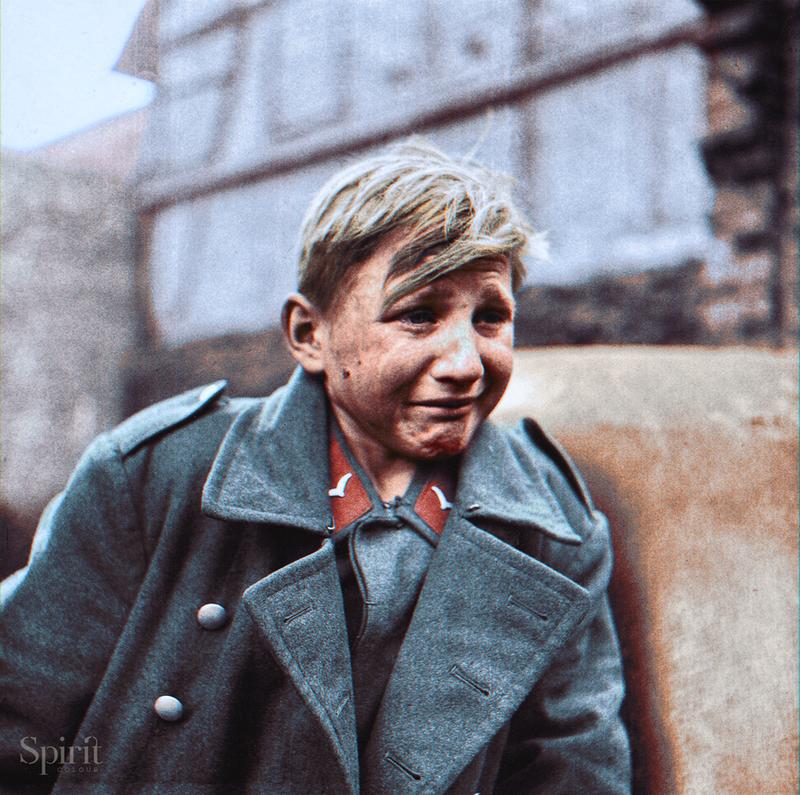
Hans-Georg Henke of Germany had a rough time as a teenager in the 1940s. He father died in 1938 and his mother died in 1944. The 15-year-old was forced to join the Luftwaffe to support his younger siblings. A member of Hitler’s Youth and an anti-aircraft soldier, Henke was trying his best to weather the war and help his family. When Soviet troops advanced on his unit and finally overtook them, young Henke burst into tears. He must have worried about how he would help his family as a prisoner of war, but his tear-streaked face became a symbol for the desperation of the German military, that they would allow children to join.
A soldier's farewell to his wife at Penn. Station, New York City, before returning to war. 1943.

The thought that every soldier keeps out their minds when leaving for war is the possibility that they’ll never come back. World War II was one of the most deadly wars of the 20th century, and the fact that there was no way to quickly communicate with friends and loved ones means that family members left at home weren’t able to hear from the boys overseas for months at a time. Katharine Phillips, a war correspondent for the Mobile Register, told PBS:
The most worries we had about the war was just death. We just never knew when we’d lose someone that we loved. Our best friend. The boy that was the brother of your best friend. We lived in constant fear of the telegrams. Each day we would read the lists in the newspaper to see if we could identify the names that were there.
Michael Rockefeller's Last Supper, Was the Wealthy Heir Eaten by Cannibals?
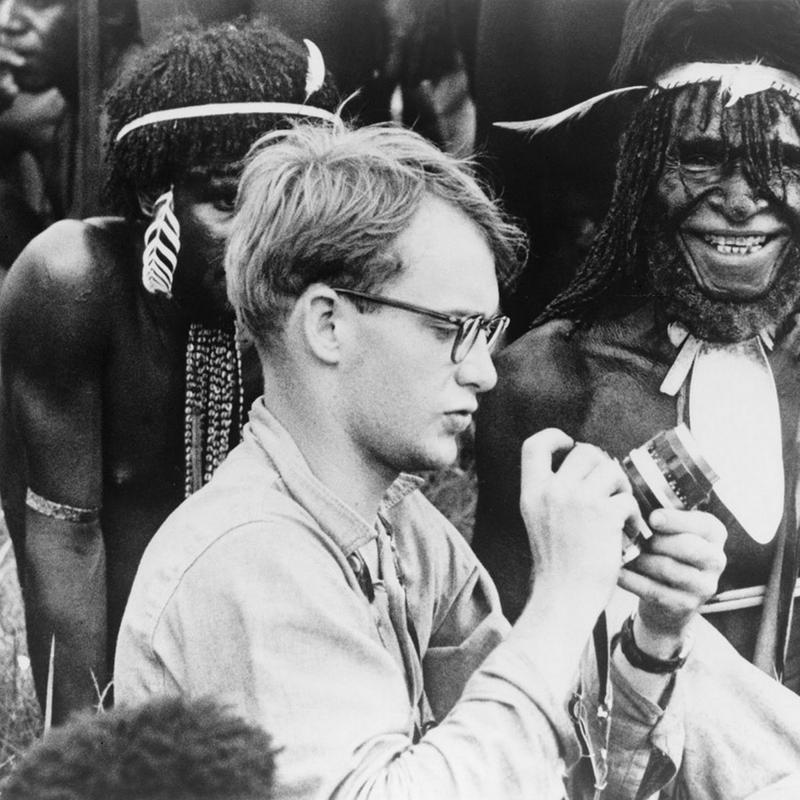
Michael Rockefeller, the youngest son of New York governor Nelson Rockefeller and great-grandson of the business tycoon and uber-wealthy John D. Rockefeller, didn’t have a passion for business like his famous family. Described as artistic and a free spirit, Michael Rockefeller was an adventurer. In the 1960s, he set off on worldwide quests to acquire primitive art. His travels led him to Papua New Guinea, which was then known as Dutch New Guinea so he could view the artwork of the indigenous Asmat people. He found the tribe to be very primitive with strange rituals and practices that were far different than those in the Western world. Intrigued, Rockefeller made a return trip in 1961, this time accompanied by a Dutch anthropologist. On approach to the island, the boat capsized, and Rockefeller tried to swim to shore. He was never seen again. Although his official cause of death was listed as drowning, rumors have circulated that he reached shore and was taken prisoner by the cannibalistic tribe who made Rockefeller their next meal.
Noted biologist Alice Eastwood inspecting the fault fissure left behind near Olema, California, after the 1906 earthquake rattled the San Andreas Fault.
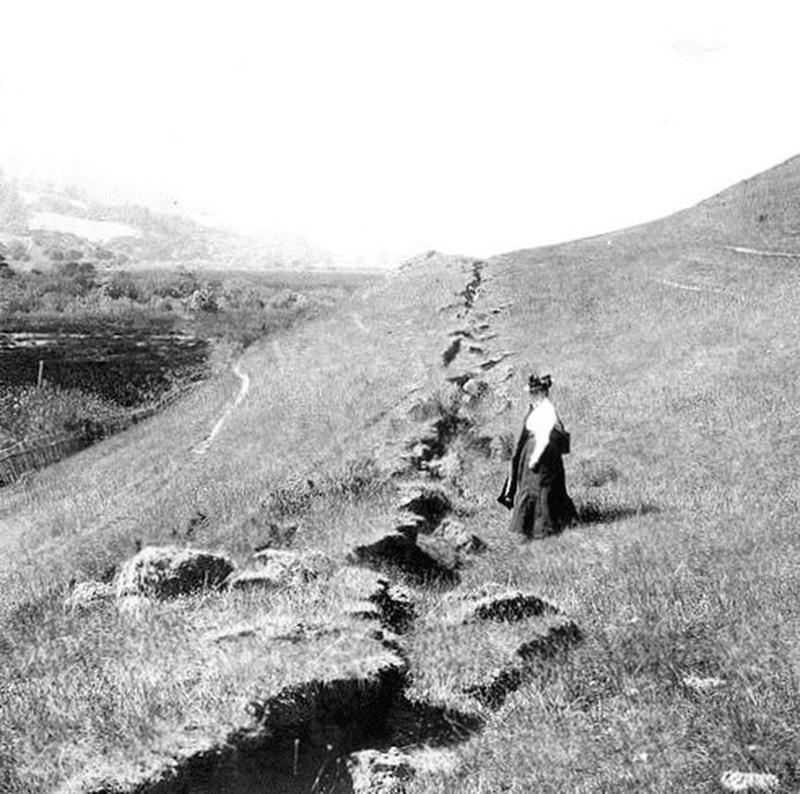
The epicenter of the great San Francisco earthquake of 1906 was actually north of the city near the sparsely populated, Olema, California. As this photograph from the time shows, the fault fissure was clearly visible. It ran for miles. This allowed scientists to study the fault line, even scientists from other disciplines. In this photo, Canadian-born botanist Alice Eastwood is observing the damage. Eastwood, a self-educated botanist, was the head of the botany department at the California Academy of Sciences at the time of the 1906 earthquake. She remained in this position until she retired in 1949. During her tenure, the department enjoyed tremendous growth.
That’s dedication! When a soccer game in 1937 was canceled due to heavy fog, no one told the goalkeeper, Sam Bartram. He remained on the pitch for 15 minutes after the game was called.
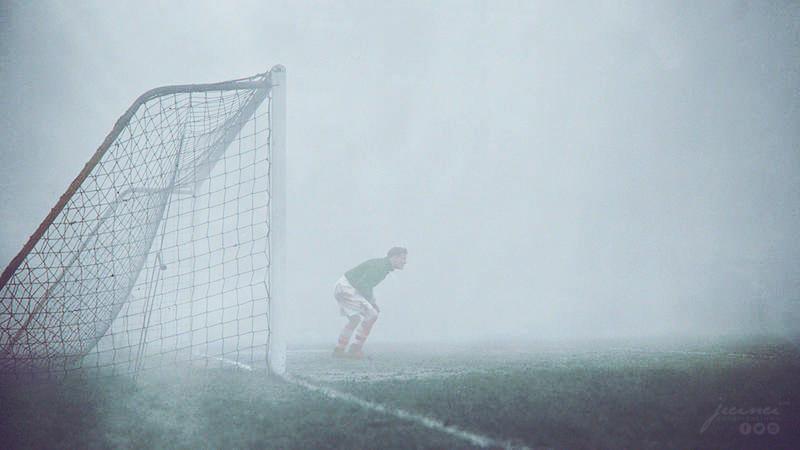
Soccer goalkeeper Sam Bartham, who played professionally for the Charlton Athletics, was playing a match against their rivals Chelsea in 1937 when a thick layer of fog settled over the pitch. Bartham later recalled watching as the fog rolled across the field, obscuring the opposing goal and all the players from sight. At first, he could see shadow figures moving in front of him. He kept his eyes peeled for an incoming soccer ball. After a while, he recalled, he noticed that the pitch was eerily silent. Still, he remained at his post. Long minutes passed and then Bartham saw a figure approaching him. To his surprise, it was not one of his teammates or a member of the opposing team. It was a police officer. The officer exclaimed, “What on earth are you doing here? The game was stopped a quarter of an hour ago!”
Bob Dylan, singer, New York, February 10, 1965.

1965 was a watermark in the life of Bob Dylan. Not only did he go electric, but he released the cue card laden video for Subterranean Homesick Blues. That year Dylan headlined the Newport Folk Festival with his first live electric set where he only played three songs. Supposedly the audience, who was prepped for a more folkie Dylan, booed the mere existence of an electric guitar.
’65 was a year when Dylan was writing and performing and the peak of his artistry, and he spent much of his time writing and recording an overwhelming amount of music. By the end of ’65 Dylan was exhausted with the media attention he received for being the nation’s poet and after a mysterious motorcycle incident he disappeared from the public eye and didn’t tour again for eight years.
Here's a great colorized photo of actress Susan Peters, 1943.

Taken in 1943, this photo shows Susan Peters taken nine years before her death from chronic kidney infection and pneumonia. At the time of this photo Peters was appearing in films like Andy Hardy's Double Life, and Assignment in Brittany, but while on a hunting trip with her husband she grabbed a shotgun and it discharged into her abdomen.
The bullet lodged in her spinal column, paralyzing her from the waist down. She spent the rest of her life in a wheelchair and continued to act in projects that allowed her to work with her paralysis.
All over Belgium and France and the Western Front of WWI, German soldiers reinforced their trenches and readied themselves to fight the enemy.

Historians call World War I the “war of trenches”. Machine guns and heavy artillery on the front lines forced both sides to dig in for protection. As the fighting raged, each side tried to breach the other’s trenches. When that happened, the loss of life was horrendous. It moved the fighting from tanks and guns to hand-to-hand combat. The trenches ran red with the blood of the fallen soldiers. The German soldier in this photograph is armed and ready to protect himself, his trench, and his fellow soldiers from an invading enemy. Many trenches left over from World War I still dot the landscape of Germany, France, and Belgium.
A dark moment in U.S. history, Japanese-Americans, like these college students in 1942, were held in internment camps during World War II.

In the days following the 1941 surprise attack by Japanese bombers on Pearl Harbor, the United States War Department feared that the Japanese may have infiltrated the country. Officials were concerned that Japanese Americans, sympathetic to the cause, they spy on the U.S. or plan further attacks on U.S. soil. The solution was to round up Japanese Americans and hold them in internment camps. The majority of Japanese Americans lived on the west coast, therefore camps were established in California, Washington, Oregon, and other locations. With just a few days to pack and settle their affairs, thousands of Japanese Americans were forced into internment camps to wait out the war.
Teenage Ivanka Trump kicking it with her famous dad. Who knew that a few short years later, Ivanka would emerge as the force in her dad’s presidency?

This photograph seems to show a close father-daughter relationship between Donald Trump and his daughter, Ivanka, in her teenage years. In reality, Ivanka has been open about how absent her father was during her childhood. A poor little rich girl, Ivanka was raised by a series of nannies and prestigious schools. She was just 11 when she learned from news reports that her father was having an affair with a model named Marla Maples. It wasn’t until she was an adult and graduated from the University of Pennsylvania with a degree in economics that she grew closer to her famous father.
Between the 1930s and the 1980s, Iranian women were free to dress and style their hair how they wanted, like this young lady in the 1960s, but the Islamic Revolution of 1979 made the hijab a requirement for all women.
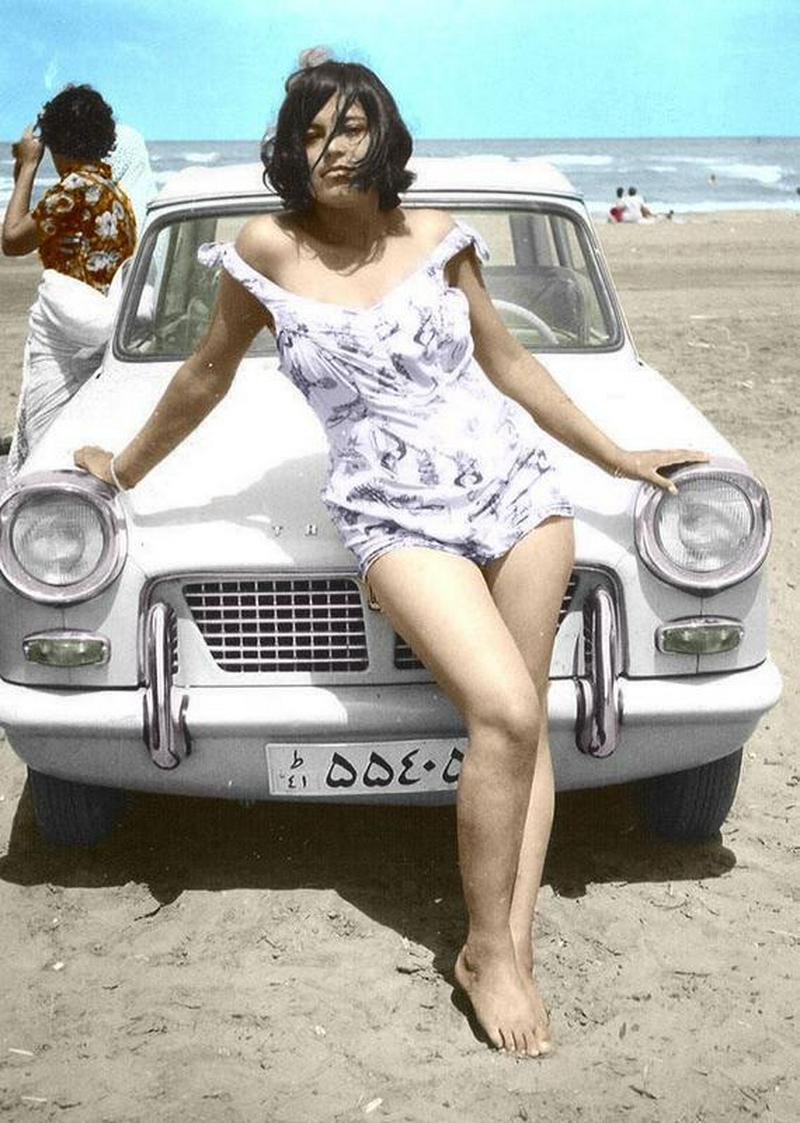
Iranian women were making great strides in the 1950s to 1970s. Thanks in part to the efforts of the Iranian Women’s Movement, women gained the right to vote, hold public office, and divorce their husbands. They enjoyed the freedom to wear whatever they wanted, like the carefree woman in this photograph. Iranian women had one foot in the modern world and were poised to take a big step. All that changed, however, after the Islamic Revolution of 1979. In the years that followed, more and more laws were passed to suppress the rights of women. The most noticeable of these laws had to do with the public dress code for women which required mandatory face veils for all females in public.
Photographer Rocco Morabito was in the right place at the right time in 1967 to capture a daring feat of mouth-to-mouth resuscitation high above the ground.
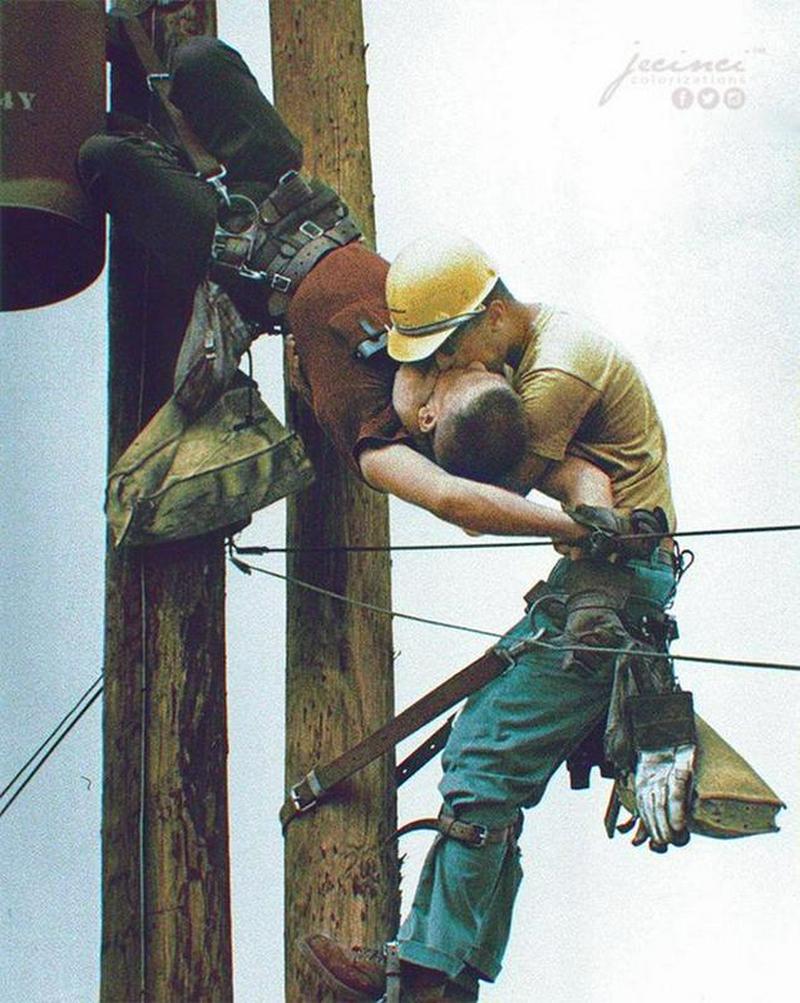
Electrical utility workers J.D. Thompson and Randall Champion were working on some low voltage lines in 1967 when Champion accidentally made contact with a live line while harnessed to the pole. The shock stopped his heart and breathing. His co-worker, Thompson sprang into action. When he reached Champion, he performed mouth-to-mouth resuscitation until he felt a faint pulse. Then he helped lower Champion to the ground where another co-worker did CPR. Champion survived and lived for another 35 years. Photographer Rocco Morabito was on his way to another assignment when he happened upon the scene. He was able to capture this dramatic photo.
Grotesque and frightening, the gargoyles atop Paris’s Notre Dame Cathedral were meant to ward off evil spirits.
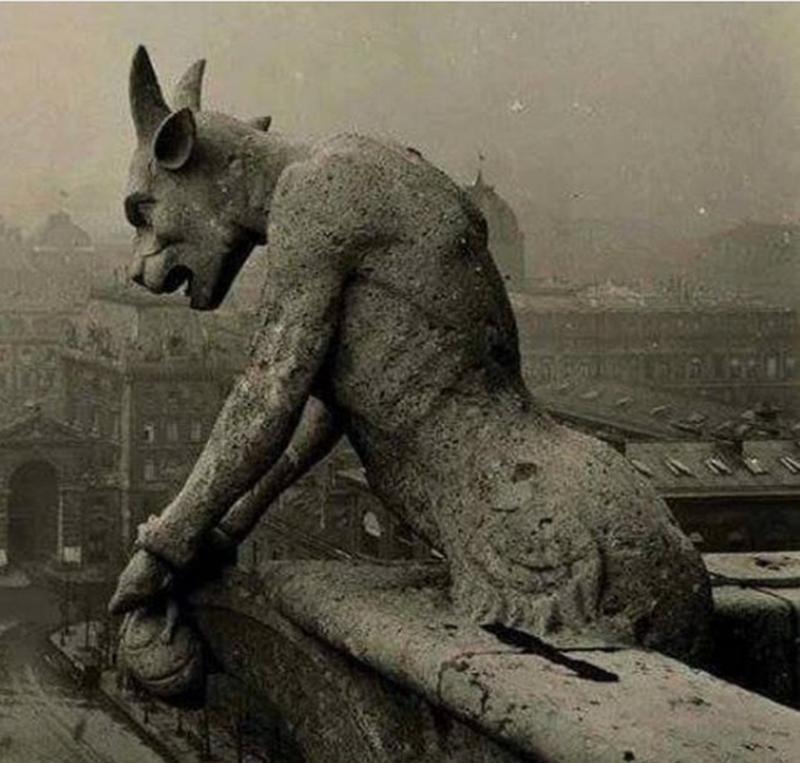
The fearsome gargoyles atop Paris’s Notre Dame Cathedral have been the subject of fascination since the gothic church was built in the Middle Ages. In fact, it is hard to think about the famous cathedral without envisioning its many stone gargoyles. According to legend, the gargoyles were put in place to ward off evil spirits and prevent bad vibes from entering the building. But the gargoyles have another, more practical, function. The stone demons hide the drain spouts that funnel rainwater off the roof to the cathedral. Did you know that no two gargoyles at Notre Dame Cathedral are the same? Each one is unique, giving rise to the idea that each one has its own distinct personality.
Elaborate and enormous hats were the hallmark of the Edwardian style as this trio of fashionable ladies from 1900 are demonstrating.
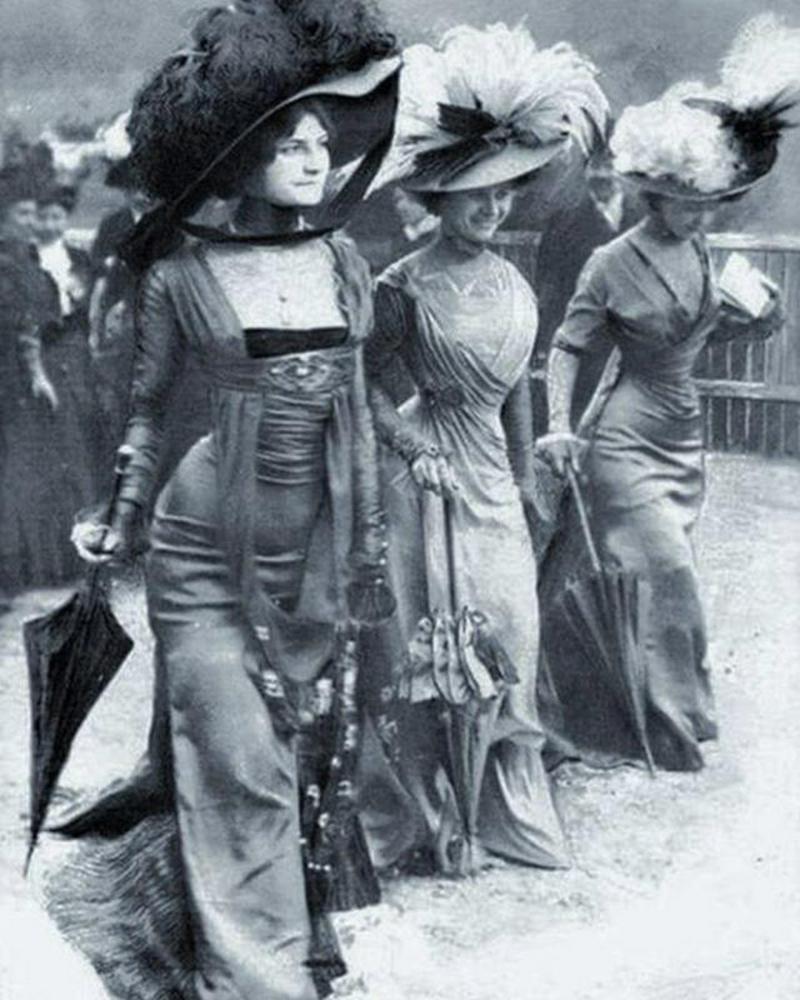
Women’s fashion underwent some drastic changes from the Victorian Era to the Edwardian Era. The full skirts of the Victorian Era gave way to more fitted and tailors dresses and skirts that accentuated the wearer’s figure. Even as the skirts became smaller, the headwear became larger. A hallmark of the Edwardian Era fashion was large, oversized, and elaborate women’s hats, worn atop equally large and elaborate hairstyles. Women piled their braided hair high on their heads … even added false hairpieces to give their updo more height. When the hats were added, there was even more volume. The hats were wide-brimmed and wound with silk or sheer veils or scarved and adorned with beads, feathers, and flowers.
Outlaw lovers Bonnie Parker and Clyde Barrow knew how to work the media to become household names and romantic figures even as they killed nine police officers and four civilians and robbed numerous banks.
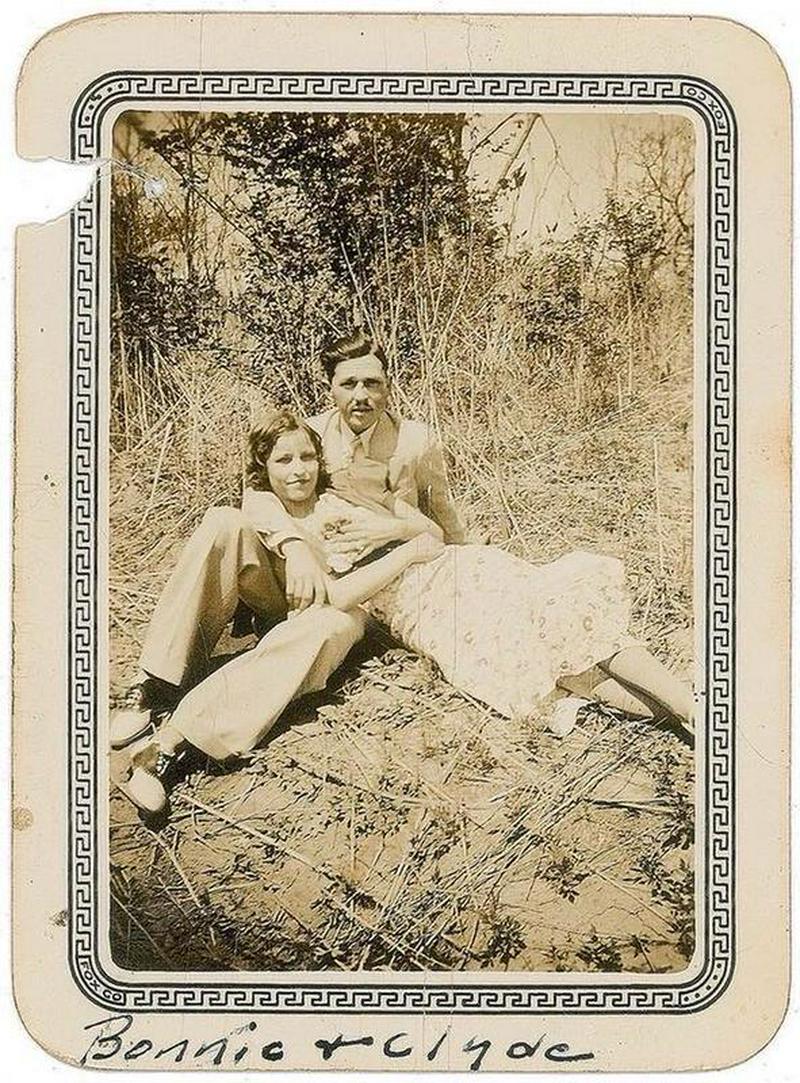
Bonnie and Clyde longed to be famous. Bonnie hoped to be a singer, actress, and dancer. Clyde, who played the saxophone, wanted to be a famous musician. The quest for fame followed them into their criminal lives. The newspapers and crime magazines of the day spread their names across the country with often exaggerated accounts of their outlaw antics. Like an Instagrammer or YouTuber today, Bonnie and Clyde kept their fame growing by producing more content. In their case, it was a series of photographs of them posing with machine guns or pics like this one that emphasis their romantic relationship.
Bill Paxton, Liam Neeson, and Patrick Swayze starred as the Gates brothers in the 1989 action thriller, “Next of Kin”, Two Decades Before Swayze’s Untimely Cancer Death.
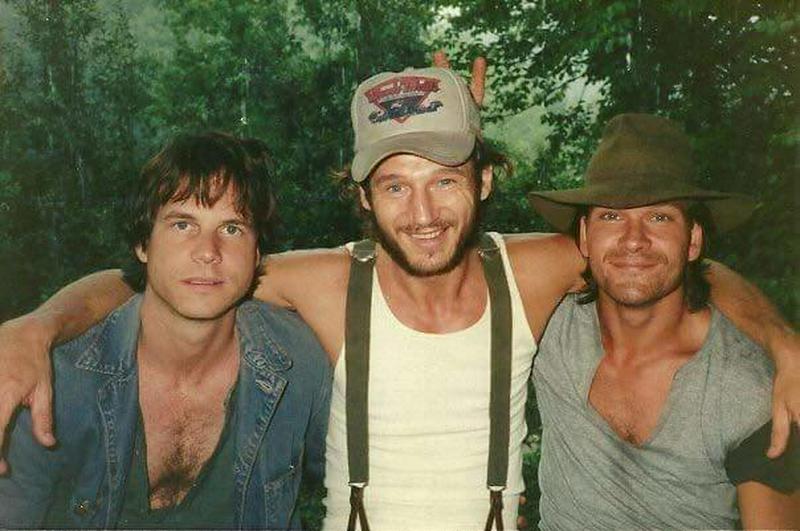
The world was shocked and saddened to hear the news of Patrick Swayze death in 2009. The actor was only 57 when he lost his battle with pancreatic cancer. A prolific performer, Swayze’s career started in the disco era when he appeared in Skatetown U.S.A. in 1979, his first film. Most of the roles Swayze played were that of tough guys with a tender, romantic heart. From Dirty Dancing to Ghost to Road House, he developed a reputation as a heartthrob, but he was a rarity in Hollywood … a happily married man.
Patrick Swayze was just 18 years old when he met Lisa Niemi. She was only 14 at the time. Five years later, on June 12, 1975, they married. Completely and totally in love, the couple were married for 34 years when Swayze died. His iconic 1987 song, “She’s Like the Wind” was written for Lisa.
Singer Dolly Parton and her husband Carl Dean, a man who stays out of the spotlight, have been happily married since 1966.
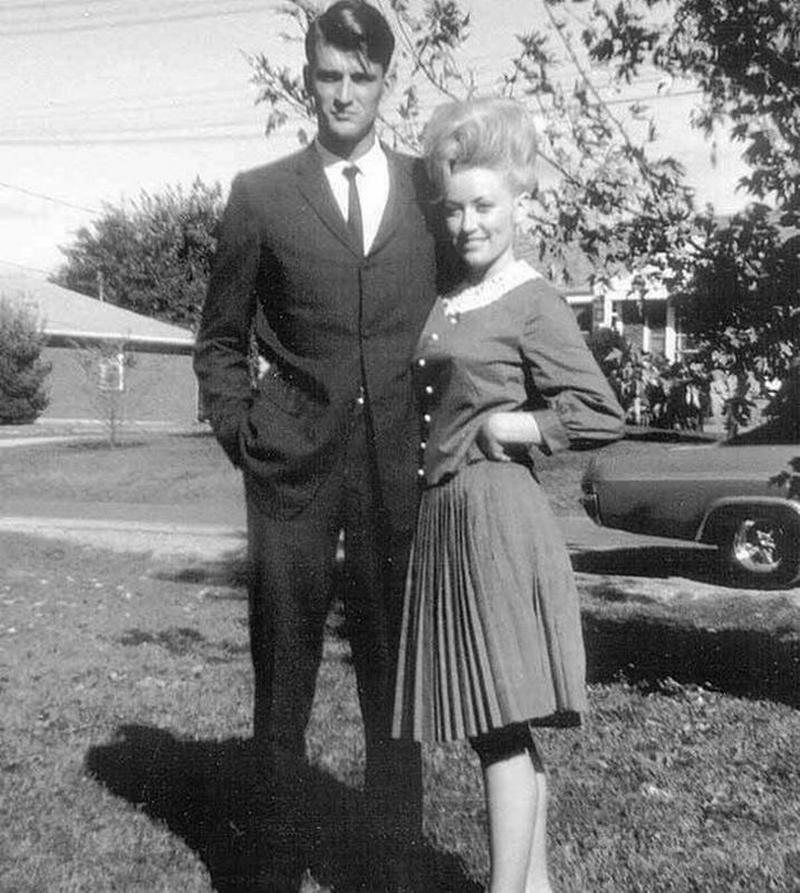
For more than 55 years, the husband of country music superstar Dolly Parton has managed to avoid the spotlight and according to Dolly, that’s just how he likes it. His name is Carl Dean. He and Dolly wed back in 1966 when she was still trying to reach her singing goals. In fact, the couple met on Dolly’s first day in Nashville and it was love at first sight for both of them. A successful businessman, Dean is proud of his wife’s accomplishments but has rarely seen her perform in concert. As Dolly explains, Dean is prone to second-hand stage fright and becomes so anxious when his wife performs that he prefers to stay away.
This 18-foot by 20-foot hole in the side of the Empire State Building, at about the 79th floor, was caused by a disoriented pilot who crashed his B-25 bomber into the skyscraper in heavy fog in 1945.

Decades before the September 11 attacks another plane struck a New York City skyscraper. This incident, which occurred on July 28, 1945, was no terrorist attack, however. It was a tragic accident. It was a foggy morning as Lieutenant Colonel William F. Smith piloted his B-25 bomber from Massachusetts to New Jersey. With near zero visibility, Smith became disoriented. At 9:40 a.m., he crashed into the side of the Empire State Building. Smith, the three people aboard his plane, and eleven people in the building were all killed. The building itself sustained heavy damage, as you can see in this picture, but the structural integrity of the Empire State Building was not compromised.
The beauty was the German commercial sailing ship, the Pamir, which launched in 1905. The last of her kind, the Pamir was outdated by the late-1940s and sank in a hurricane in 1957.

When she was built in 1906, the German sailing ship, the Pamir, was a beautiful steel-hulled, state-of-the-art ship that could reach a top speed of 16 knots. She saw action in World War I and World War II. In fact, she dodged a close call with a Japanese submarine and emerged unscathed. But after four decades of service, the sailing ship was no longer efficient and speedy. Newer, sleeker, speedier sailing ships could pass her with ease. It was no longer profitable to ship cargo on the Pamir. On September 21, 1957, the Pamir was caught in Hurricane Carrie and sank. Only six members of her crew survived.
After Allied Forces liberated the Buchenwald concentration camp in May 1945, U.S. soldiers discovered this cache of wedding rings taken from Jewish prisoners.

When Jewish, Jehovah’s Witness, and Roma Gypsy prisoners were taken to the German concentration camp at Buchenwald, they were stripped of their belongings. The Germans kept a cache of gold wedding rings, seen in this photograph, as well as wristwatches, pocket watches, gold fillings, and other jewelry taken from prisoners. The sheer volume of these wedding rings is a testament to the number of people who were killed in this concentration camp. The camp was liberated on April 11, 1945, by soldiers from the Third Army. More than 21,000 prisoners were freed that day but thousands others who came before them were not so lucky.
An all-natural Japanese Geisha without the elaborate makeup, up-do, and costume … a natural beauty, circa 1910.

Geishas were much more than upscale call girls. The geisha tradition runs deep. Geishas are trained in all aspects of gracious hospitality, tea serving, hosting, and much more. Traditionally, geishas grew their hair long so they could style it in elaborate updos to please their clients. They also donned traditional makeup and costumes. It is rare to see a geisha without their makeup, costume, and hairstyles, like the woman shown in this photograph from 1910. The role of the geisha in modern society is controversial. Are they sex workers or merely companions for hire who will uphold the traditions of Japanese culture?
When African American sprinters Jesse Owens and Ralph Metcalfe took gold and silver in the Olympic 100-meter dash in 1936, a Dutch newspaper ran a headline proclaiming bronze medalist Tinus Osendarp of the Netherlands “the best white sprinter at the Summer Olympics”.

American athlete Jesse Owens shattered stereotypes during his historic 1936 Olympic performances. There were many people who were shocked at how easily he beat white athletes. It stirred up a lot of racist sentiments and dashed Hitler’s plans. The German leader hoped to use the 1936 Olympic Games to showcase the superiority of his Aryan athletes. But the African-American track star ruined those plans. Still looking for a way to spin the story after Owens and another African-American sprinter, Ralph Metcalfe took the gold and silver in the 100-meter dash, a Dutch newspaper ran a headline calling the bronze medalist the “best white sprinter at the Summer Olympics.”
Thousands of Allied forces landed on the beaches of Normandy on D-Day, June 6, 1944, making this operation the largest amphibious attack.

During the invasion of Normandy in 1944, more than 156,000 Allied ground troops came ashore on the beaches of France to face German troops numbering about 50,000. The heaviest fighting occurred at Omaha Beach. Allied bombing runs failed to destroy the German’s fortified artillery, leaving Allied troops vulnerable as they came ashore. To make matters worse, the beach was lined with mines. Still, the U.S. troops pushed through toward a well-defended seawall and up a bluff to reach the Nazi soldiers. It was a tough fight for the soldiers and a hard-fought victory. In all, roughly 2,400 U.S. soldiers died on Omaha Beach on that one day, June 6, 1944.
More than a pretty face, Brigitte Bardot retired in 1973 to devote her life to animal rights.

Brigitte Bardot earned a reputation as a femme fatale in the 1950s and 1960s. She appeared in more than 40 films and recorded a slew of musical albums. Despite her fame, Bardot felt drawn to activism. In 1973, she walked away from the spotlight to devote herself to a cause that was near and dear to her heart. Animal rights. She used her famous name and even more famous face to raise money for the protection and welfare of animals. She founded the Brigitte Bardot Foundation in 1986 to help further her work in animal activism. She has been outspoken against cultural practices around the globe that have put animals in danger, from seal hunting in Canada to the consumption of horse meat to bullfighting in Spain.
The appropriately named Mammoth was the tallest horse in history. Born in 1848, Mammoth topped out at 7 feet, 2 ½ inches, or more than 21 hands, in height.

The world record holder for the tallest and heaviest horse to ever live belongs to a gelding named Sampson, whose name was later changed to the more appropriate-sounding Mammoth. The horse was bred in Toddington Mills in Bedfordshire, UK, by Thomas Cleaver. To Cleaver’s surprise, the horse grew to an astonishing height. At his peak in 1850, Mammoth measured 21.2 ½ hands in height which converts to 7 feet 2 ½ inches. He topped out at a weight of 1,524 kg,or 3,359 pounds.
Self-confessed Boston Strangler Albert DeSalvo is taken into custody after his arrest, north of Boston in Lynn, Mass. - Feb. 25, 1967.

From 1962 to 1964 Boston, Massachusetts was gripped with terror about the next time that the Boston Strangler would act. Also known as the “silk stocking murders,” the victims were all women who had no sign of forced entry into their homes and they were found strangled with household items. Towards the end of the crimes they were found with nylon stocking around their necks.
DeSalvo’s DNA was matched to that found on the final victim of the strangler, but there’s a theory that the crimes were committed by more than one person. However, DeSalvo admitted to the murders while in prison and according to the Boston police the murders ended after DeSalvo’s arrest.
Fritz Haber - Nobel Prize Laureate & "Father of Chemical Warfare "

As Germany’s leading physical chemist during World War I, Haber was on call throughout the fighting in order to create stronger and more deadly chemical weapons for use by the army. As the fighting increased Germany called on Haber to come up with crazier weapons. When the military wanted tear gas, he figured out how to make it. Haber even devised a way to turn chlorine into a weapon.
Following the end of World War I in 1918 Haber was awarded the Nobel Peace Prize for his work on nitrogen fixation which helped create weapons as well as produce fertilizers.
Mafia boss Charles 'Lucky' Luciano in exile in Sicily, Italy, December 31, 1948.

What do you do when you’re an imprisoned crime boss and the U.S. government comes to you and asks for your help with the war effort? If you’re Lucky Luciano you find a way to commute your sentence so you can get out of jail while helping the U.S. military keep the New York docks safe. While working with Luciano, the military enacted “Operation Underworld” in order to make sure no German or Italian agents entered the US through the New York waterfront.
In 1946 Luciano’s sentence was commuted and he was deported to Italy. Supposedly whenever he encountered an American who recognized him he was happy to take a photo and sign autographs.
New York in the early 1900s.

New York City has always been the center of the western world, even at the turn of the century the city was filling with aristocrats and people looking to make their way in the world. In 1900 the city was still getting used to having gas lamps and the slow change from residential streets to a city full of skyscrapers.
Office buildings went up on Lower Broadway and across the city, towering over the many buildings that existed in the era for a generation. At the time New Yorkers were unsure about the modern buildings, but now these buildings are a way of life.
Colorful outfits on these flight attendants back in 1965.

The stylish, mod inspired outfits of the 1960s were one of the best things about the flights of the greatest decade. These outfits were emblematic of the space age down to their ice cream colored skirts and their head wraps. The outfits were simple and crisp, and they looked good whether they were walking down the tarmac or the aisle of a jumbo jet.
The ‘60s were the era of women wearing go-go boots on an airplane while men in suits sucked down martinis on their cross-country work trips. Modern outfits may be more functional, but they don’t look anywhere near as good.
Wearing of the green- Lucille Ball looking glamorous in this colorized photo from the '40s.

Lucille Ball always had a fascinating look, she didn’t look like the rest of the Hollywood starlettes of the era and that’s what made her stand out. Before she changed the comedy landscape with I Love Lucy, Ball was busy appearing in comedies by the Marx Brothers and for pictures by RKO. While many people would have found disheartening she persisted and became one of the most famous people on the planet. Ball later explained that she got to the top of mountain with persistence and hard work:
Luck? I don't know anything about luck. I've never banked on it, and I'm afraid of people who do. Luck to me is something else: Hard work — and realizing what is opportunity and what isn't.
Christopher Robin and his fiancee Lesley de Selincourt - 21st April 1948.

The son of author A.A. Milne, Christopher Robin was the basis of his father’s most beloved creation Winnie The Pooh. Robin had a hard time growing up with a famous father who mined his life for stories, and he later said that Milne was often at the Garrick Club while his mother was dressing him in “girlish” clothes. As he grew older he had a distaste for the character who shared his name. He said:
At home I still liked him, indeed felt at times quite proud that I shared his name and was able to bask in some of his glory. At school, however, I began to dislike him, and I found myself disliking him more and more the older I got.
Colorized photo of an 11-year-old coal miner in 1908.

With the coal industry booming in the late 19th century, corporations were looking for as much cheap labor as possible. At the time there were no laws against hiring children, so if they could hold a pickaxe or shovel then they were put to work digging in the mines. By 1910 there were near 2 million children working in the coal mines, but as the NCLC sent photographers around to capture young tipple boys like this the photos began circulating and people were outraged.
It took a few years before labor laws were enacted, but but 1916 the Child Labor Act was put in place and minimum age requirements were enacted and maximum shift lengths were put in place for young workers.
Colorized photo of Queen Victoria and King Edward VII with their family at a wedding in Coburg, Germany, 1894.

The wedding of Princess Victoria Melita of Saxe-Coburg and Gotha was a major affair in world politics in late 19th century. On April, 19 1894 dignitaries from across Europe, including King Edward VII, Queen Victoria, and Grand Duke Vladimir of Russia, it’s a major get together. This photo is one of only a few that show the entire European royal family (and they were very much a family) together before erupting in World War I. After the wedding Queen Victoria wrote in her journal:
The whole of our large family party were photographed by English, as well as German photographers. Many groups were taken, & some of me with Vicky & my 3 sons, & William.
Colorized photograph of a photographer busy at work at the Jersey Shore in 1912.

There’s nothing quite like a day at the beach. Today you and your friends can whip out your camera phones and get as many pictures as you want of your waterfront fun, but in the early 20th century beach-going friends had to rely on photographers using view cameras to capture their memories. With one of these photographers all you had to do was slip them some cash and get your photo taken.
Of course, anyone getting their photo snapped had to wait until the photos were processed and printed which could take a while if you were dealing with a lazy photographer.
Construction of the Cologne Cathedral in 1855.

When the foundation of the Cologne Cathedral was laid in 1248 the builders had no way of knowing that their work wouldn’t be finished in their lifetime. Initially the work on the cathedral ended in 1473 when the south tower was completed. That seemed to be that until the 19th century, but when the original plan for the façade was discovered the Protestant Prussian Court decided to complete the chapel according to the original plans.
632 years after the construction of the cathedral began Germany’s largest cathedral was brought to an end, making it the tallest building in the world for a few years until the Washington Monument was finished.
Dining with Hans von Luck. A photo caption in the album reads - “With Tommy flyers at Fécamp, 12 Juni 1940”.

Most soldiers don’t want to be in the middle of a war. High ranking officers would rather discuss game theory than actually get into the muck, but World War II was an all hands on deck situation. Hans-Ulrich Freiherr von Luck und Witten, known as Hans von Luck, got his start in the German army in 1929, an by the time the second world war broke out he was commanding a unit in the 7th Panzer Division.
In June of 1940 he became captain of the 3rd Panzer Group of Army Group Center and was sent to Moscow, but after complaining that it was too cold he was moved to Africa where he had a friendly ceasefire with British troops until 1945. Following his time in North Africa he was moved back to Russia where he was captured by the Soviet army. He spent five years as a prisoner of war and was generally liked by everyone who met him.
Flight-Lieutenant R H A Lee, after being awarded the DSO and DFC, and Flying Officer K H Blair, after being awarded the DFC, by King George VI at RAF Hornchurch, Essex. 27 July 1940

The DSO and DFC are prestigious military decorations of the United Kingdom, they’re earned through bravery and sharp action while in the line of duty. Richard Hugh Antony Lee joined 85 Squadron of the RAF in 1938 and as soon as war broke out he was dispatched to France. After the 85's first victory in 1939 he was awarded the DFC, and on May 10 1940 was awarded the DFC after bringing down a Hs126.
Lee was a seriously tough soldier, on May 11, 1940 he was shot down and captured by German forces before escaping and making his way back to his squad. His final mission was spent with 85 Squadron in pursuit of an enemy formation. No one knows what happened to him and it’s presumed he was brought down on August 18.
Women in a "tableau" pose, imitating Henry Mosler’s painting, "The Birth of the Flag" - 1917

“The Birth of the Flag” was painted in 1911 by Henry Mosler, and while this photo was taken six years later it’s clear that this was a fast turn around for what passed as a meme in the early 20th century. Today kids are doing the mannequin challenge and crying while they dance on Tik Tok, but in 1917 girls everywhere were posing with the American flag and copying Henry Mosler paintings.
People have always wanted to be a broader part of culture, whether that’s taking part in a current social media challenge or doing something more wholesome and patriotic like these ladies. It’s interesting to know that we never change.
The RMS Titanic in color, 1912.

Constructed early in the 20th century, the Titanic’s keel was laid in 1909 right next to its sister ship The Olympic. The unsinkable ship was built as a home away from home for the world’s wealthiest people. The first-class amenities were unlike those on any other ship, and the second-class accommodations were just as good if not better than the first-class sections on other ships.
The Titanic was launched on May 31, 1911 but it wasn’t considered seaworthy until April 1912. Sitting at 52,000 tons when its weight was displaced, the massive ship took its maiden and only voyage on April 10, 1912.
Tsarevich Alexei Nikolaevich Romanov aboard the Imperial yacht Polar Star, c.1907.

The last Tsesarevich and heir apparent to the throne of the Russian Empire, Alexei Nikolaevich, Tsarevich was the youngest child and only son of Emperor Nicholas II and Empress Alexandra Feodorovna. Unfortunately he suffered from hemophilia for his entire life, a congenital disease that causes internal bleeding and slow blood coagulation. Anna Vyrubova, one of the Empress’ closest helpers remembered:
It was endless torture for the boy and for each of us… he was screaming from the pain all the time, and we had to close our ears while taking care of him.
Supposedly the only person who could help the boy was the Siberian mystic Rasputin who allegedly hypnotized the child until he felt better. He passed away at the age of 13 when his entire family was executed in the cellar room of the Ipatiev House in Yekaterinburg.
Girls play the guitar. USSR 70s.

Is there anything better than a group of kids just having fun and not worrying about the rigors of real life? The USSR in the 1970s wasn’t easy. Communism was still the main government of the day, but it was waining at the height of the Cold War. The country was in the throes of chaos as the Communist party tried to exercise total ideological control over the country’s inhabitants.
Soviets did their best to ignore the more dour facts of life by hanging out and trying to have a good time with one another. The real resistance to overbearing communism was fading joy wherever they could, especially among friends and maybe even a guitar.
Eutaw Street in Baltimore, Maryland. (1955)

Downtown Baltimore is home to Eutaw Street, where people go to see the Orioles play during baseball season or just stroll around the streets in search of a cold drink on a hot day. In 1950s the street was much more quiet than it is today. Lined with residences and large brick buildings, the area was also a great place to go in search of fresh fish.
This photo shows just how much an area can change in just a few decades. Some places that seem like they’ll house families forever can just as easily become major hotspots in the blink of an eye.
General Dwight D. Eisenhower addresses American paratroopers prior to D-Day.

Before the US military descended on the beaches of Normandy for D-Day, they were met by General Dwight D. Eisenhower who gave them words of impassioned encouragement. He spoke to men whose boots were hitting the ground and released a memo for everyone to read. He said:
You are about to embark upon the Great Crusade, toward which we have striven these many months. The eyes of the world are upon you. The hopes and prayers of liberty-loving people everywhere march with you. In company with our brave Allies and brothers-in-arms on other Fronts, you will bring about the destruction of the German war machine, the elimination pf Nazi tyranny over the oppressed people of Europe, and security for ourselves in a free world.
Bill Murray around 1970

Growing up in Illinois, Bill Murray may not have known it at the time, but he was destined for greatness in the world of entertainment.
From a young age, he had a passion for performing. Murray was the lead singer in a teenage rock band and took part in his high school theater productions. He briefly attended college with the intention of becoming a doctor, but his love for comedy proved too strong to resist.
After dropping out of college, Murray joined an improv comedy group, which was headed by his older brother Brian. This led to him performing on The National Lampoon Radio Hour and eventually landing a spot on the iconic Saturday Night Live.
Murray's career really took off from there. He starred in hit movies like Meatballs, Caddyshack, Tootsie, Stripes, and the unforgettable Ghostbusters. His talent for comedy and acting won him awards such as the Golden Globe, BAFTA, and Academy Award.

